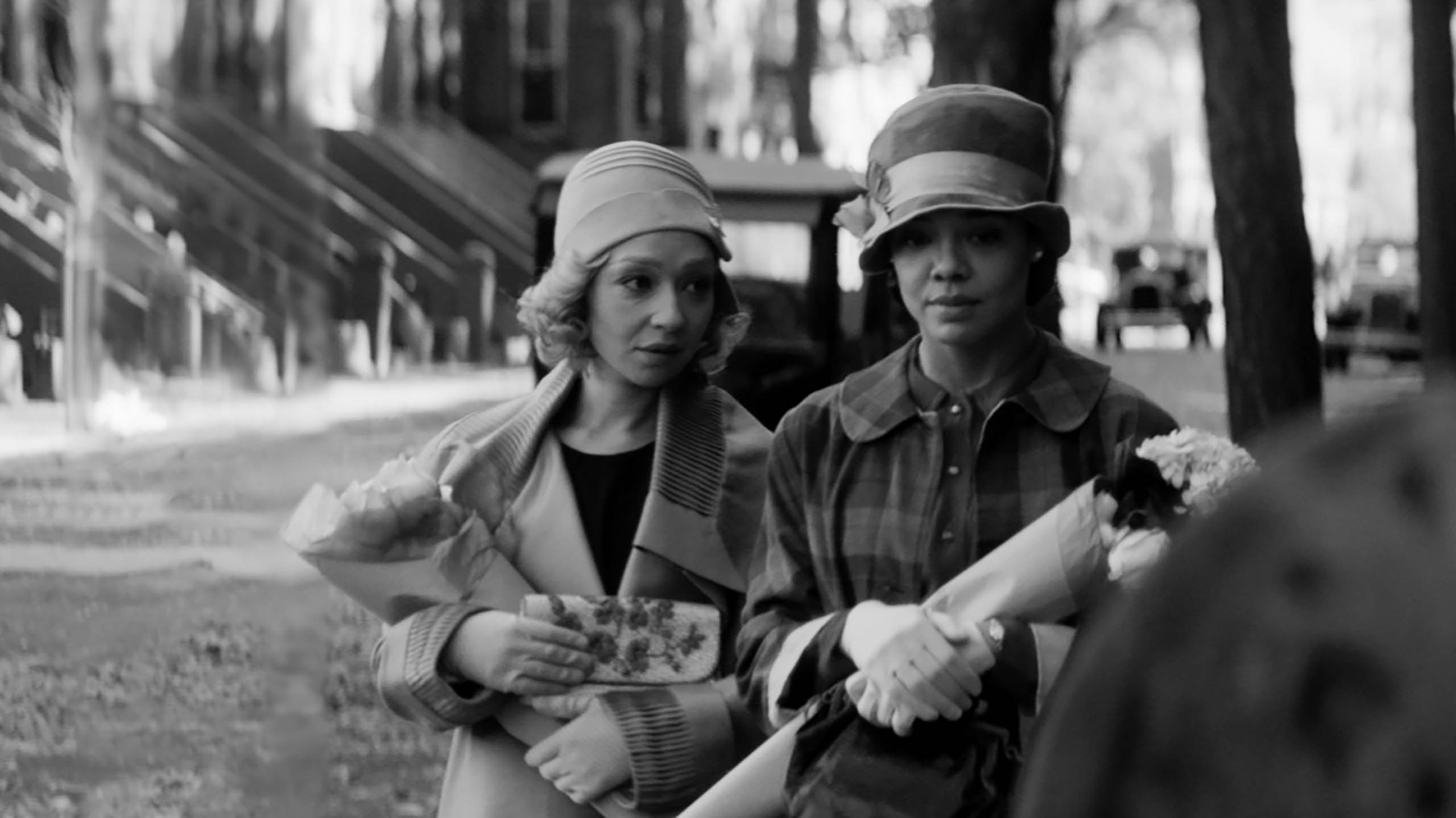What to Watch Verdict
Passing uses its beautiful lyricism to deftly explore nuanced themes but falls just short of its potential.
Pros
- +
🌑Tessa Thompson and Ruth Negga!
- +
🌑Gorgeous, evocative cinematography.
- +
🌑Brimming with empathy for its characters.
Cons
- -
🌑Only scratches the surface with its commentary.
Passing opens on a simmering summer day in the 1920s, as Irene Redfield (Tessa Thompson) chances a shopping trip downtown, beyond the safety of Harlem’s boundaries. As she brushes shoulders with a store's exclusively white clientele, she hides beneath a wide-brimmed hat, as though trying to disappear even when directly interacting with the clerk. Though we don’t yet know the details, her anxiety is palpable, adding to the heat of the sweltering sun. We share in her relief as she exits the store for the cooler and less crowded tea room of the Drayton Hotel. It is here that the film really begins, as Irene locks eyes with Clare Kendry (Ruth Negga), her old childhood friend.
Against all odds, Clare recognizes Irene from across the room and initiates their chance encounter. Even more improbable is the fact that the two women, both light-skinned and mixed-race, have bumped into each other while attempting to pass as white in a place that would otherwise be off-limits to them. This detail, revealed in their conversation, explains Irene's nerves when interacting with others but is, surprisingly, not mirrored in Clare. Negga’s performance exudes confidence and comfort. Her character is magnetic, moving through the world with ease and dazzling charm. She soon reveals that passing is not an occasional choice, but an everyday fact. Much to Irene’s surprise, Clare has “crossed” racial lines completely, married a white man (Alexander Skarsgård) and established a new life as a white woman.
Their unexpected reunion ignites complex feelings in the two women, both developing dual obsessions with the other's life. Seeing Irene sparks Clare’s desire to reconnect with Black culture and, perhaps more importantly, gives her the means to do so. She begins tagging along with Irene to events and using her connections to form new friendships. Meanwhile, Irene seems to traverse a wave of different emotions, at times reluctant to maintain their friendship yet endlessly curious about the details of Clare’s decision to 'pass'. Through their relationship, the film tackles everything from racism and colorism to sexuality and identity. Their opposing lifestyles raise within them the question of happiness and satisfaction: can they have one without the other? And do they actually have either, to begin with?
The film has a lyricism to it, it's visually poetic with a gorgeous score to match. Much credit is due to Devonte Hynes, a hauntingly beautiful score that comes as no surprise, for those who know his work on We Are Who We Are. Alongside his score, director Rebecca Hall guides the film’s aesthetics — though the decision to shoot in black and white, with a 4:3 aspect ratio, sounds gimmicky, it sets the film's tone. Hall’s visuals aptly emulate old-school portraiture, trapping the characters within a tight boundary while promising a close examination. At times Hall’s camera is confrontational, giving her characters little room to hide and so revealing all the more of their internal struggles. Her direction exudes the kind of confidence and intention you wouldn't expect from a directorial debut — proving just how much she’s capable of — while being one of many elements setting the film up for success.
Throughout the film, Negga is a consistent scene-stealer — whose presence is sorely missed when she leaves the frame. Though quieter in her performance, Thompson is just as effective, battling emotions that tend to go unvoiced. Often using expressions in the place of words, both actresses speak volumes about the way their character's choices are affecting them.
Passing — based on Nella Larsen’s 1929 novel of the same name — makes much effort to emulate the delicate subtlety of its source material. This decision often feels to the detriment of the film, leaving too much unsaid and unexplored. There are ways to tackle these subjects subtly and much of that work is done by Negga and Thompson’s restrained, yet evocative performances. However, coming nearly 100 years after the source material should allow the opportunity to delve further into topics that are endlessly nuanced and all too rarely dissected. The threads are present but often left hanging. The film begins to question colorism within the Black community and the long-term effects of internalized racism, but never voices or fully explores the implications for our main characters.
Passing is commendable for all that it manages to do, deftly delving into subjects too rarely explored onscreen. It's ultimately impossible to not want more from a film with such talent behind it.
The latest updates, reviews and unmissable series to watch and more!
Hall, Thompson and Negga clearly see the depth of the story and all that bubbles beneath the surface. There’s an opportunity to delve headfirst into the questions of class, race and sexuality — the driving forces of Larsen’s novella — and to do so less coyly. Yet, every chance it gets, the film opts for ambiguity. Despite the disappointment with this approach, Passing is still a powerful adaptation of a beloved novel. Complex and wrought with emotion, the film offers stunning performances both onscreen and off.

